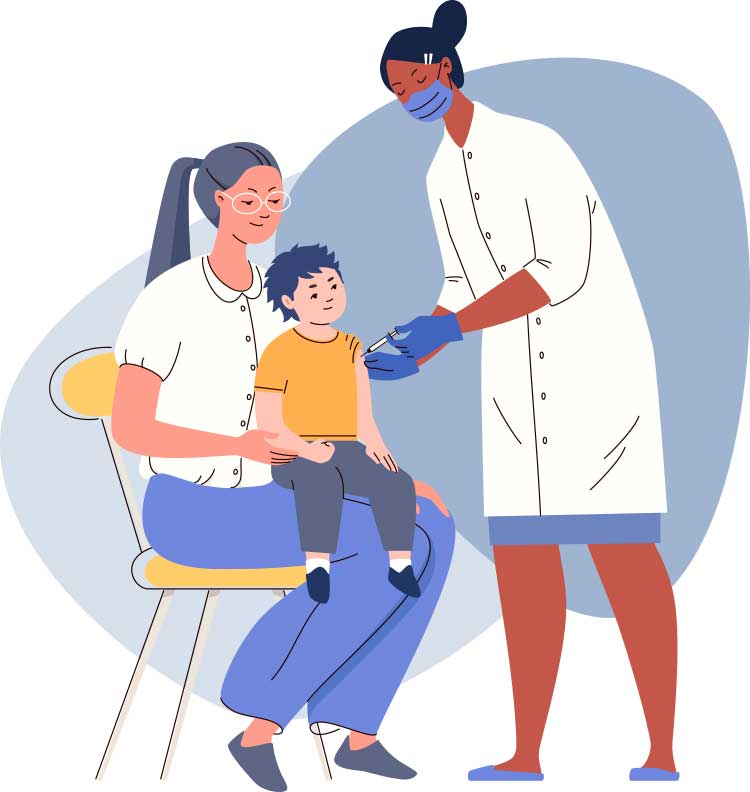Vaccine FAQ
COVID-19 MODERNA BOOSTERS NOW AVAILABLE
Open Cities Health Center encourages everyone who is medically able to receive the vaccine to get the vaccine as soon as possible. If you’ve completed your second Moderna or Pfizer vaccine over 6 months ago AND you are age 65+, you are eligible to receive a booster shot! You are also eligible for a booster if you received a Johnson & Johnson vaccine over 2 months ago. Whether you received Moderna, Pfizer, or J&J, you are able to mix and match boosters. Patients may also schedule a nurse visit to get the booster at either Rice Street or Dunlap locations by calling the COVID Vaccine Number at (651) 251-5967.
Current Open Cities Health Center patients who are 50+ or who are 18+ AND high risk or immunocompromised may also request a booster as part of their regular health visit. We continue to offer Pfizer vaccines for youth 12 and up by appointment at our main number at (651) 290-9200.

The vaccine is being distributed in phases.
Phase 1a: frontline healthcare personnel and long-term care residents
Phase 1b: other essential workers (education, food and agriculture, utilities, police, firefighters, corrections officers, transportation)
Phase 1c: Adults with high-risk medical conditions and adults 65+
The vaccine will become available to the general public after that. We do not know yet when the vaccine will be available to all. It could be as early as early summer or as late as fall. Currently, vaccines are only approved for use on people of 16 years or older. A children’s vaccine will come at a later time.
OCHC is distributing the Moderna vaccine. The vaccine is given in 2 doses, 28 days apart. Protection kicks in about 2 weeks after the second dose. Even after getting vaccinated, it is recommended that you wear a mask and continue to social distance until the vaccine has been widely distributed.
Some people experience side effects for a few days after the vaccine, including soreness in the arm where the vaccine was injected, muscle aches, headaches, and occasionally fever.
For a walk-through of what it is like to get the vaccine, check out Rep. Alexandria Ocasio-Cortez’s livestream of her experience here.
- if you have been hospitalized for COVID-19 treatment
- if you have ad the flue vaccine within the last two weeks
- have any allergies
- have a fever
- have a bleeding disorder or are on a blood thinner
- are immunocompromised or are on a medicine that affects your immune system
- are pregnant or plan to become pregnant
- are breastfeeding
- have received another COVID-19 vaccine
FDA has authorized the emergency use of the Moderna COVID-19 Vaccine in individuals 18 years of age and older.
FDA has authorized the emergency use of the Pfizer-BioNTech COVID-19 Vaccine in individuals 16 years of age and older.
- Had a severe allergic reaction after a previous dose of this vaccine
- had a severe allergic reaction to any ingredient of this vaccine.
- Injection site reactions: pain, tenderness and swelling of the lymph nodes in the same arm of the injection, swelling (hardness), and redness
- General side effects: fatigue, headache, muscle pain, joint pain, chills, nausea and vomiting, and fever
- Difficulty breathing
- Swelling of your face and throat
- A fast heartbeat
- A bad rash all over your body
- Dizziness and weakness
- Visit with other fully vaccinated people indoors without wearing masks or physical distancing
- Visit with unvaccinated people from a single household who are at low risk for severe COVID-19 disease indoors without wearing masks or physical distancing
- Refrain from quarantine and testing following a known exposure if asymptomatic
- Take precautions in public like wearing a well-fitted mask and physical distancing
- Wear masks, practice physical distancing, and adhere to other prevention measures when visiting with unvaccinated people who are at increased risk for severe COVID-19 disease or who have an unvaccinated household member who is at increased risk for severe COVID-19 disease.
Open Cities Health Center
- (651) 290-9200
- info@opencitieshealth.org
Dunlap Clinic
409 North Dunlap St.
St. Paul, MN 55104
HOURS
MWTHF: 8am – 5pm
Tuesdays: 8am – 8pm
North End Clinic
916 Rice St.
St. Paul, MN 55117
HOURS
Monday – Friday: 8am – 5pm
Health Services
*Dental services are available Monday, Wednesday, Thursday and Fridays only at Dunlap.
About Us
Open Cities Health Center is a FTCA deemed Facility.
This health center receives HHS funding and has Federal PHS deemed status with respect to certain health or health-related claims, including medical malpractice claims, for itself and its covered individuals.

